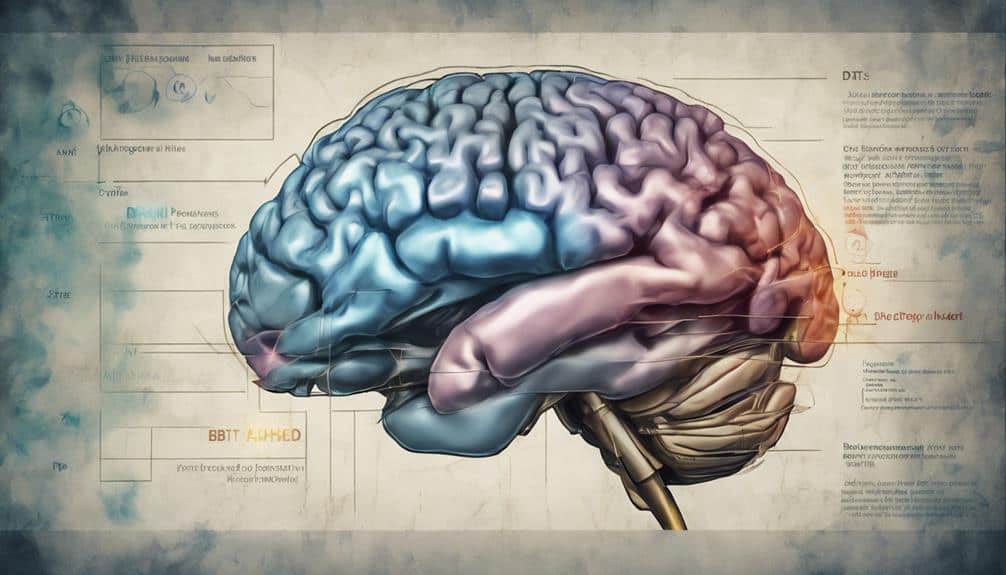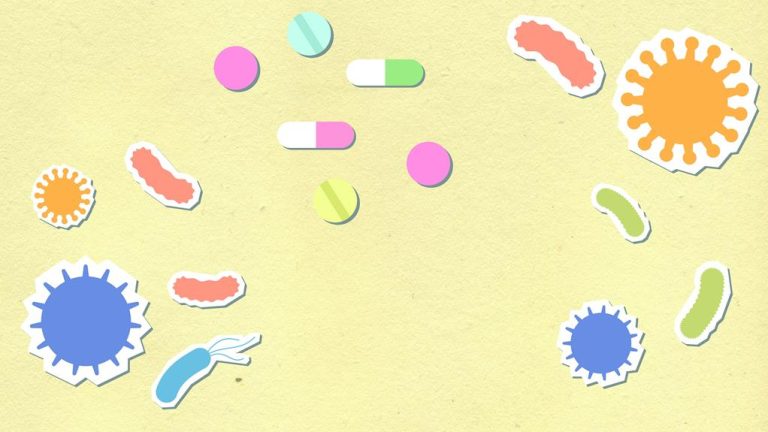Dbt for Adhd
So, you think managing ADHD is just about medications and coping strategies? Well, think again. Dialectical Behavior Therapy (DBT) might just offer a fresh perspective on tackling ADHD that goes beyond the usual approaches.
Imagine a treatment that not only addresses the symptoms but also equips individuals with the tools to navigate their emotions and impulses in a more effective way.
Interested in exploring how DBT could revolutionize ADHD management?
Key Takeaways
- DBT addresses emotion dysregulation and impulse control in ADHD.
- Research supports DBT in reducing ADHD symptoms and enhancing functioning.
- Key modules include Emotion Regulation, Distress Tolerance, and Interpersonal Effectiveness.
- Tailored coping strategies in DBT help manage ADHD symptoms effectively.
Understanding ADHD and DBT

Understanding ADHD and DBT involves recognizing the core symptoms of Attention-Deficit/Hyperactivity Disorder and how Dialectical Behavior Therapy addresses these challenges effectively. ADHD is characterized by inattention, hyperactivity, and impulsivity, which can have a substantial impact on daily functioning in adults and college students. DBT, focusing on Emotion Regulation and Distress Tolerance, aligns well with treating these symptoms by helping individuals learn to focus on the present and modify ineffective behaviors.
Structured therapy sessions in DBT aim to address ADHD symptoms while improving the overall quality of life for individuals. Research has shown the efficacy of DBT in reducing ADHD symptoms and enhancing functioning in adults and college students. By providing tools for managing emotions and increasing distress tolerance, DBT equips individuals with ADHD with valuable skills to navigate their challenges effectively. This structured approach offers a promising avenue for individuals seeking to better manage their ADHD symptoms and improve their overall well-being.
Effectiveness of DBT for ADHD

DBT demonstrates notable efficacy in addressing emotion dysregulation and impulse control issues associated with ADHD. Research indicates that DBT interventions are effective in reducing ADHD symptoms and enhancing overall functioning.
By focusing on Emotion Regulation, Distress Tolerance, and Interpersonal Effectiveness, DBT equips individuals with the necessary skills to manage their emotions and improve impulse control, which are common challenges for those with ADHD.
Studies have shown that DBT-based therapy leads to a significant reduction in ADHD symptoms, indicating its potential as a treatment option for individuals with ADHD. The behavioral strategies and emphasis on emotional regulation in DBT align well with the core difficulties experienced by individuals with ADHD, making it a promising therapeutic approach for addressing the complex needs of this population.
Research further supports the feasibility and effectiveness of DBT in treating adults and college students with ADHD, highlighting its adaptability across different age groups and settings.
Key Modules in DBT for ADHD

Implementing key modules in DBT for ADHD involves integrating specific skills that target core symptoms and challenges associated with the disorder. These Dialectical Behavior Therapy (DBT) modules are important for ADHD adults in developing coping strategies tailored to their needs:
- Mindfulness: Enhances attention and focus by training individuals to be present in the moment, reducing distractions common in ADHD.
- Emotion Regulation: Assists in managing intense emotions often experienced by individuals with ADHD, promoting emotional stability and self-control.
- Distress Tolerance: Teaches techniques to handle distressing situations without impulsive reactions, aiding in better decision-making under pressure.
- Interpersonal Effectiveness: Guides individuals in effective communication and boundary-setting within relationships, fostering healthier interactions and reducing interpersonal conflicts.
DBT Skills for Managing Symptoms

Incorporating DBT skills for managing symptoms in ADHD involves applying targeted techniques to address specific challenges faced by individuals with the disorder. DBT assists in inhibiting impulsive behaviors through mindfulness techniques, providing strategies for individuals to pause before acting impulsively.
By refocusing attention, individuals with ADHD can prevent the escalation of negative emotions, promoting emotional regulation. Value-based actions play an important role in DBT for ADHD, helping individuals align their behaviors with their core values.
Effective emotion management is emphasized in DBT, offering practical tools to navigate intense emotions commonly experienced in ADHD. Moreover, DBT techniques aid in decision-making and problem-solving, empowering individuals to make informed choices and address challenges effectively.
Tailoring DBT Techniques for ADHD

Tailoring techniques in therapy for ADHD involves customizing interventions to address specific challenges related to emotion regulation, impulse control, and executive functioning. When applying Dialectical Behavioral Therapy (DBT) for individuals with ADHD, it's essential to adapt the techniques to cater to their unique needs. Here are some ways DBT techniques can be tailored for individuals with ADHD:
- Mindfulness: DBT skills are modified to enhance attention and concentration, helping individuals with ADHD manage their inattention symptoms effectively.
- Distress Tolerance: Techniques are adjusted to assist individuals in coping with emotional overwhelm and impulsivity, common challenges faced by those with ADHD.
- Interpersonal Effectiveness: Skills are customized to improve social interactions and communication difficulties frequently experienced by individuals with ADHD.
- Executive Functioning: DBT interventions are tailored to address difficulties in planning, organizing, and managing time, enhancing overall executive functioning abilities in individuals with ADHD.
Research Evidence on DBT for ADHD

Research findings demonstrate the effectiveness of Dialectical Behavioral Therapy (DBT) in addressing executive functioning deficits and improving overall quality of life in adults with ADHD. Studies have shown that DBT-based group treatment greatly reduces executive functioning deficits in this population. Moreover, participants undergoing DBT displayed sustained enhancements in ADHD symptoms, as well as reductions in depressive and anxiety symptoms, leading to an overall improvement in quality of life compared to standard treatment approaches.
The high completion rate of 86% in a 14-week trial indicates the feasibility and acceptability of DBT for adults with ADHD. Remarkably, DBT has emerged as a promising non-pharmacological treatment option for ADHD, emphasizing its effectiveness in enhancing emotional regulation and interpersonal skills. The integration of DBT into ADHD treatment has proven superior in symptom reduction, underscoring the importance of structured skill-building programs.
These research findings provide compelling evidence supporting the incorporation of DBT in the thorough care of adults with ADHD.
Implementing DBT in ADHD Treatment

Implementing DBT in ADHD treatment involves teaching individuals specific coping strategies and skills tailored to managing ADHD symptoms. These skills include:
- Mindfulness to enhance focus
- Emotion regulation to manage intense feelings
- Distress tolerance for handling stress
- Interpersonal effectiveness to improve relationships
Skills for ADHD
In treating ADHD, incorporating DBT skills can greatly enhance emotional regulation and interpersonal communication. When working with individuals with ADHD, it's crucial to focus on specific skills to address their unique challenges. Here are key skills from DBT that can be beneficial:
- Mindfulness: Teaching individuals to stay present can improve focus and attention in ADHD.
- Distress Tolerance: Techniques to handle negative emotions effectively, reducing impulsivity in ADHD.
- Emotion Regulation: Learning to manage emotional intensity can lead to better control over reactions.
- Interpersonal Effectiveness: Enhancing communication skills and relationships can be crucial for individuals with ADHD.
These skills are fundamental for improving emotional control, managing stress, and effectively addressing ADHD symptoms.
Coping Strategies
Utilizing coping strategies rooted in Dialectical Behavior Therapy (DBT) can greatly enhance emotional regulation and reduce impulsivity in individuals with ADHD.
In ADHD treatment, DBT offers coping strategies such as mindfulness practices, emotion regulation techniques, and interpersonal effectiveness skills. These strategies provide individuals with structured support to navigate challenging situations effectively.
By incorporating DBT coping strategies, individuals with ADHD can improve their decision-making abilities, emotional control, and ultimately enhance their overall quality of life.
DBT skills help individuals focus on the present moment, manage distressing emotions, and interact more effectively with others.
The integration of DBT coping strategies in ADHD treatment empowers individuals to develop essential skills for coping with impulsivity and enhancing their emotional well-being.
Frequently Asked Questions
Can You Use DBT for Adhd?
Yes, mindfulness techniques, coping skills, emotional regulation, impulse control, self-awareness, distress tolerance, interpersonal effectiveness, goal setting, problem solving, and stress management are integral components of using DBT for ADHD to enhance symptom management and overall functioning.
Which Is Better for ADHD DBT or Cbt?
DBT may be more effective for ADHD than CBT. It focuses on emotion regulation, distress tolerance, and interpersonal effectiveness. The tailored approach addresses impulsivity and low self-esteem. DBT's structured sessions offer significant support for managing attention and behavior.
Who Is DBT Not Recommended For?
DBT may not be suitable for individuals with severe cognitive impairments, acute crises, psychosis, or substance abuse. Those with unstable relationships, suicidal thoughts, or schizophrenia may benefit from more intensive therapy tailored to their specific needs.
What Is the Best Therapy Technique for Adhd?
The best therapy technique for ADHD involves integrating mindfulness practice, behavioral strategies, coping skills, emotional regulation, dialectical thinking, interpersonal effectiveness, distress tolerance, self-awareness, impulse control, and problem-solving. These elements collectively address the complex challenges of ADHD.
Conclusion
Comprehensive, DBT offers a promising approach for managing ADHD symptoms through skill-building and emotional regulation.
Like a guiding light in a stormy sea, DBT provides individuals with ADHD the tools needed to navigate the challenges of impulsivity, emotional dysregulation, and distress tolerance.
Research supports the effectiveness of DBT in improving quality of life for adults with ADHD, offering a valuable non-pharmacological treatment option for those seeking holistic and comprehensive care.







